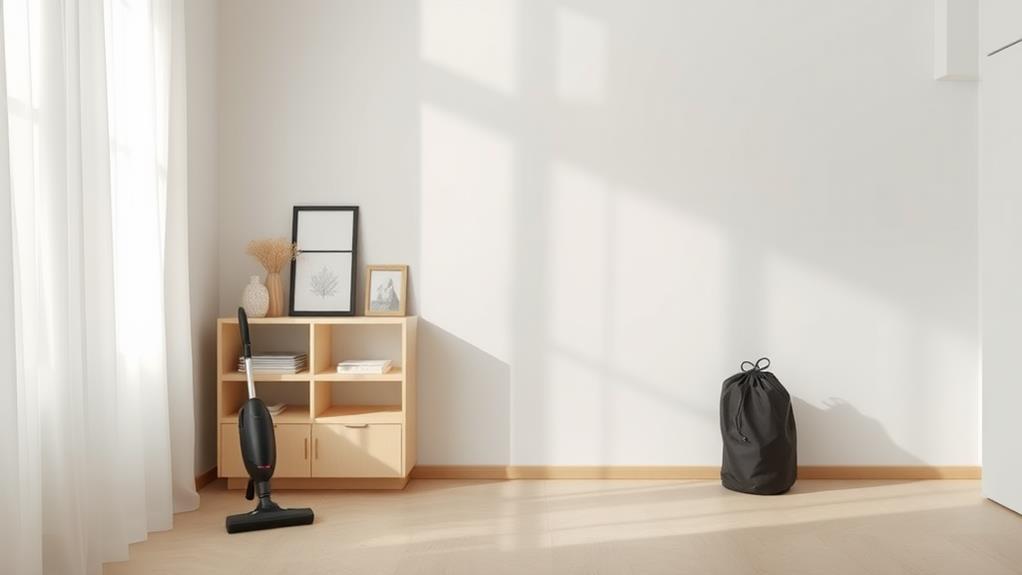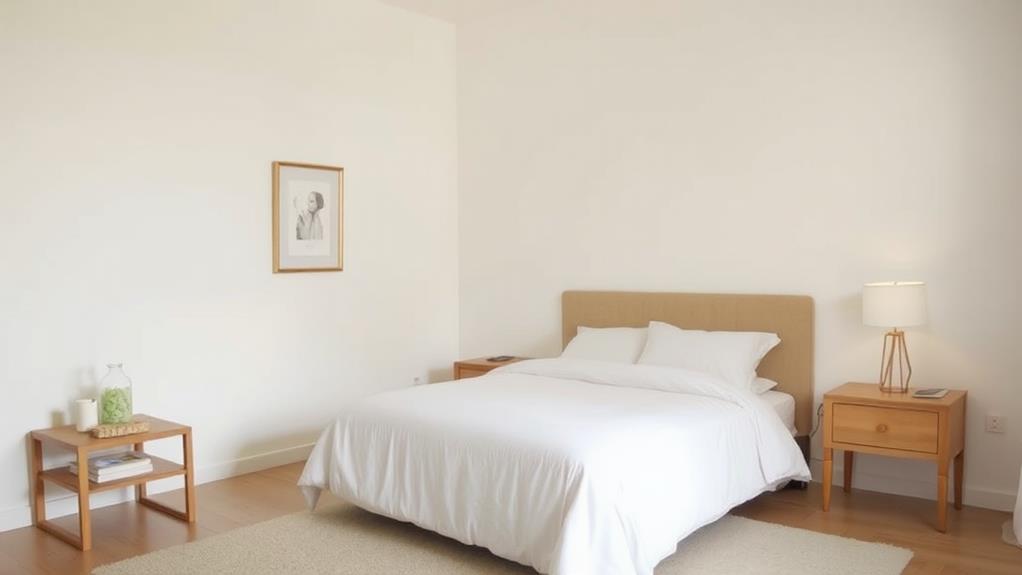In your home, you can easily declutter outdated electronics that you don't use anymore and tangled cords that accumulate over time. Unused kitchen gadgets and old towels take up space without serving any purpose. Don't forget to check for duplicate items, old magazines, and unread books that clutter your shelves. Expired medications not only create disorganization but can also pose safety risks. By letting go of random knickknacks and unnecessary kitchenware, you can create a more functional and peaceful space. Curious about more items to declutter? There's plenty more to evaluate for a clearer home and mind.
Summary
- Assess outdated electronics and tangled cords for recycling or disposal to create a cleaner, more organized space.
- Identify and consolidate duplicate kitchen gadgets and utensils to streamline cooking efficiency and reclaim valuable storage.
- Evaluate clothing in your wardrobe, keeping only items you wear regularly and donating the rest to optimize your style and space.
- Simplify home decor by keeping only meaningful pieces that bring joy, reducing clutter and enhancing your living environment.
- Sort through old magazines and books, recycling those that no longer serve a purpose to declutter and promote a more sustainable space.
Outdated Electronics
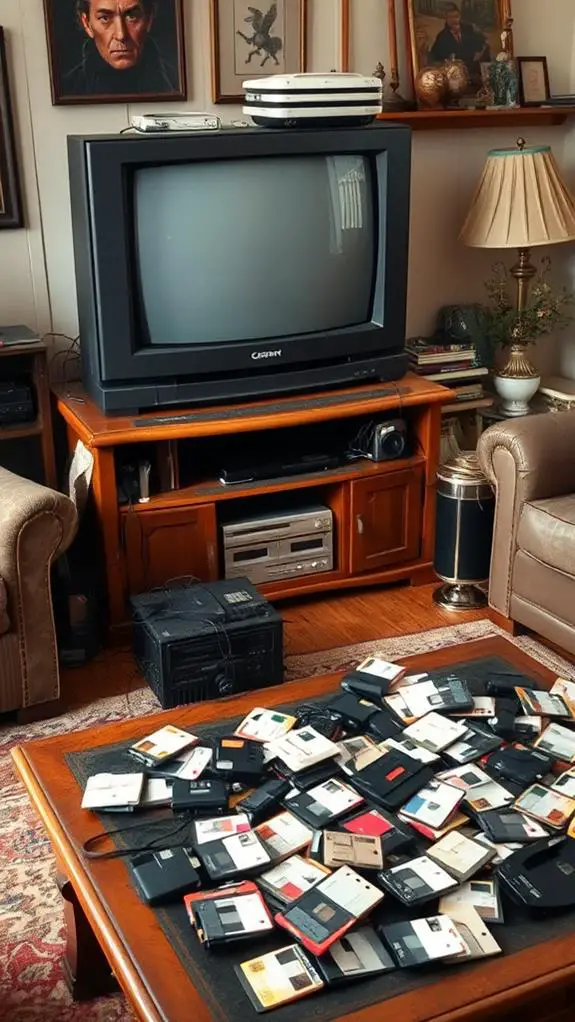
Outdated electronics can clutter your space and weigh on your mind, creating a sense of chaos that disrupts your peace.
You might find yourself surrounded by unused chargers and outdated cables that serve no purpose. It's time to take action.
Start by identifying devices you haven't touched in months, if not years. Gather those obsolete gadgets and assess whether they still hold value or can be recycled.
Don't forget to check for those tangled cords that seem to multiply—many of them will be outdated and unnecessary.
By freeing yourself from this clutter, you make room for innovation and the latest technology that truly enhances your life.
Embrace the simplicity of a cleaner space, and enjoy the mental clarity that follows.
Expired Medications

Expired medications can pose a hidden threat in your home, cluttering your cabinets and potentially leading to safety risks. Keeping them around can confuse family members and increase the chance of accidental ingestion.
Start by conducting a thorough medication inventory; check expiration dates and separate the outdated items.
Once you've identified what's expired, it's essential to focus on safety disposal. Many pharmacies offer take-back programs, or you can follow local guidelines for disposing of medications safely.
Don't just toss them in the trash—doing so can harm the environment. By decluttering expired medications, you'll create a safer, more organized space.
Unused Kitchen Gadgets
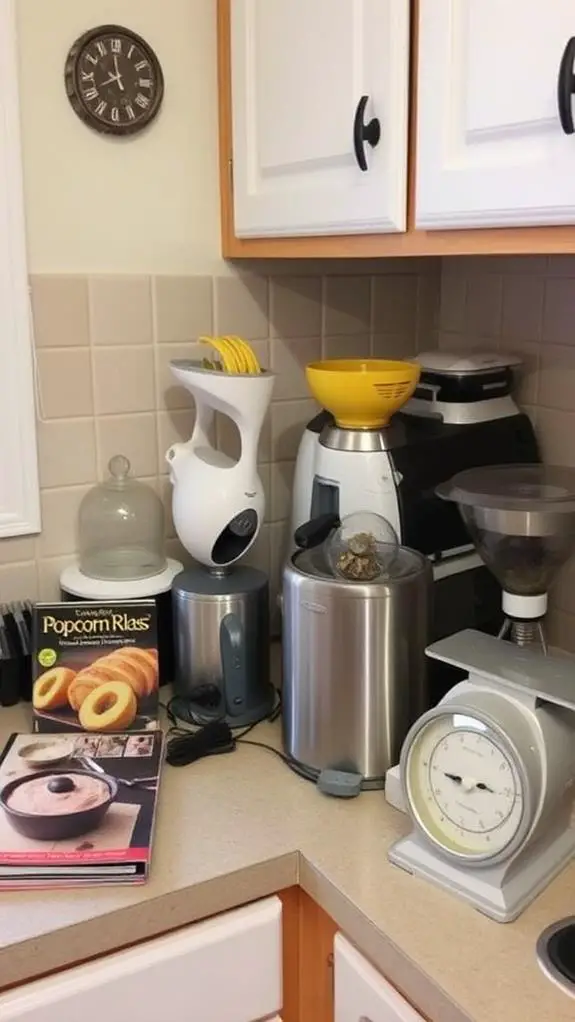
Take a look at your kitchen gadgets and identify which ones you haven't used in ages.
Assess if any multi-function tools can replace those specialty utensils gathering dust.
Simplifying your kitchen can make cooking more enjoyable and efficient.
Identify Unused Appliances
Many kitchens are filled with gadgets that rarely see the light of day. Take a moment to evaluate your unused appliances. You might find items like yogurt makers, electric can openers, or specialty coffee machines collecting dust.
Consider their appliance lifespan—most of them won't serve you well if they're never used. If you haven't touched something in over a year, it's time to let it go. Not only will decluttering free up space, but it'll also improve your kitchen's energy efficiency, reducing unnecessary electricity waste.
Focus on tools that genuinely enhance your cooking experience. By identifying and removing these unused appliances, you'll create a more functional, innovative space that inspires you to cook and experiment.
Assess Multi-Function Tools
Multi-function tools can be a game-changer in your kitchen, but they often become just another set of unused gadgets.
Take a moment to assess the multi-tool benefits these versatile tools bring. If you've got a gadget that claims to chop, blend, and spiralize, but you only use it for one task, it's time to reconsider its place in your kitchen.
Ask yourself: is it truly adding value, or is it just taking up space? Embrace innovation by keeping only those tools that genuinely enhance your cooking experience.
Simplifying your kitchen not only clears clutter but also streamlines meal prep. Let go of the unused gadgets, and make room for tools that truly work for you.
Evaluate Specialty Utensils
After sorting through your multi-functional tools, it's time to look at those specialty utensils that often gather dust in the back of your drawers.
Think about those specialty spoons and unique peelers you once thought you'd use but haven't touched in ages. If you haven't used them in the past year, chances are you won't in the future.
Consider their practicality—do they solve a specific problem or just take up space?
Embrace innovation by keeping only what truly enhances your cooking experience. You might discover that you can accomplish the same tasks with tools you already own.
Let go of the clutter, and create a streamlined kitchen that inspires creativity rather than frustration. It's time to declutter and simplify your cooking space.
Duplicate Items
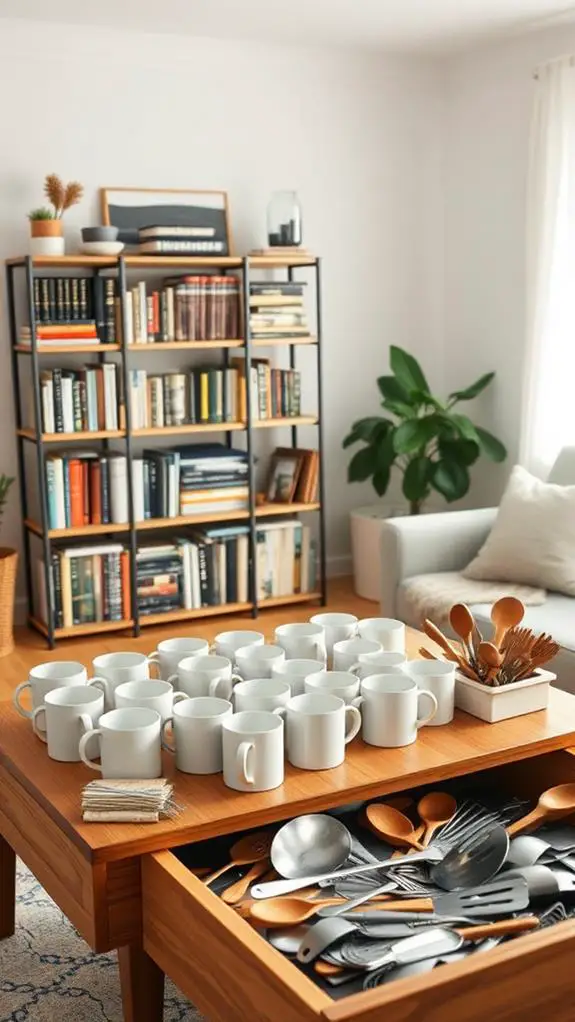
You might be surprised at how many duplicate items you have cluttering your space.
Identifying these duplicates not only helps you regain valuable room, but it also makes your home feel more organized and peaceful.
Let's explore the types of duplicates you might find and the benefits of letting them go.
Types of Duplicates
Many homes contain at least three common types of duplicate items that can clutter your space and complicate your daily life.
First, think about kitchen gadgets; you might've multiple can openers or measuring cups. These can be easily consolidated using smart organizing strategies.
Next, consider clothing—how many black shirts do you really need? Let go of extras, even if you feel an emotional attachment.
Finally, check your tech; chargers and cables often multiply without you noticing.
By identifying these duplicates, you can streamline your belongings and create a more functional environment.
Embrace the challenge, and focus on what truly serves you. Your space will feel lighter, and you'll reclaim valuable time and energy every day.
Benefits of Decluttering
Regularly decluttering duplicate items can greatly enhance your living space and mental well-being.
You'll experience mental clarity as you clear away clutter, allowing for enhanced focus and better productivity. With increased space, your home will feel more inviting and organized, reducing stress and promoting emotional relief.
Improved organization not only saves you time but also helps you find what you need without the hassle of sorting through duplicates.
Plus, there are financial benefits; selling or donating duplicates can free up extra cash or help those in need.
Embrace simplified living by letting go of what you don't use. Ultimately, decluttering duplicates fosters a peaceful environment where you can thrive, making room for new ideas and experiences.
Old Magazines and Newspapers
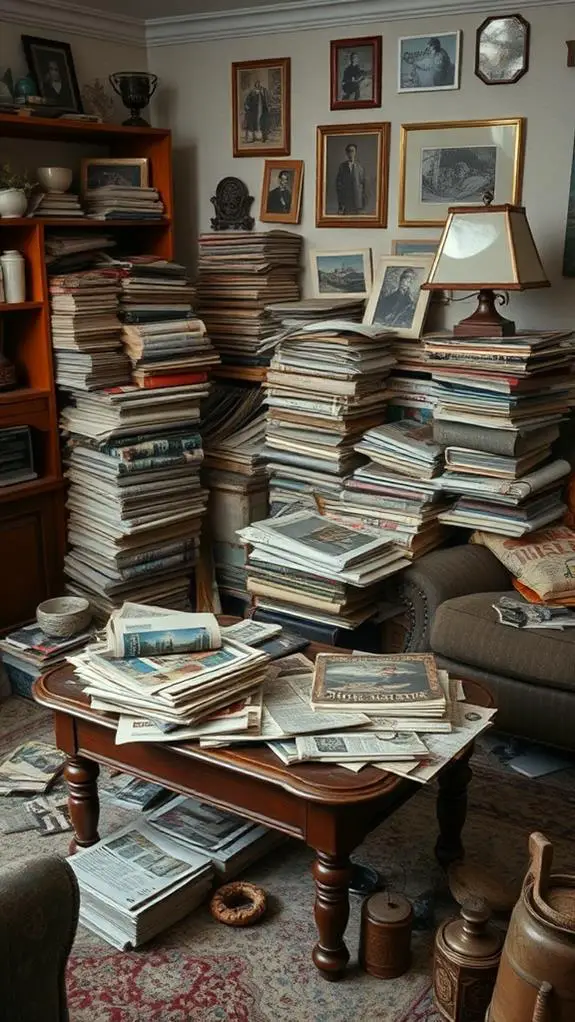
Over time, old magazines and newspapers can pile up, taking up valuable space in your home.
It's easy to hold onto them for sentimental reasons, but consider the benefits of letting go. Start by sorting through your collection—keep only the issues that spark joy or contain essential information.
The rest? They're perfect candidates for magazine recycling. Many local facilities accept them, turning clutter into reusable materials.
You can also explore newspaper repurposing; use them for crafts, gift wrapping, or even pet bedding.
By decluttering these outdated items, you're not only freeing up space but also contributing to a more sustainable environment.
Clothing You Never Wear
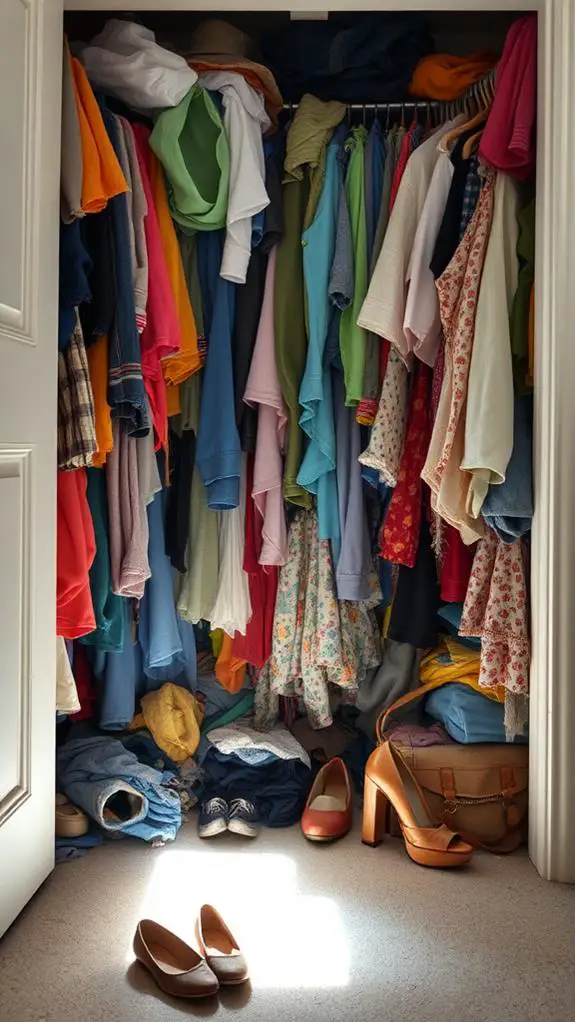
It's time to tackle the clothing you never wear.
Start by identifying those unworn items and evaluating your seasonal wardrobe needs.
Consider donating or selling what you no longer use, freeing up space and giving those pieces a new life.
Identify Unworn Items
Many people find themselves with a closet full of clothing they never wear, often due to impulse purchases or fleeting trends.
To tackle this, start with a wardrobe assessment. Pull everything out, and be honest about what you truly love and wear. If you haven't touched an item in over a year, it's likely time to let it go.
Create piles: keep, donate, and discard. For unworn items, consider clothing donations to give them a new life. This not only clears your space but also helps those in need.
Seasonal Wardrobe Assessment
After identifying unworn items, it's time to conduct a seasonal wardrobe assessment. This is your opportunity to embrace a fresh seasonal style and optimize your wardrobe rotation.
Start by pulling out everything you haven't worn in the last year. Ask yourself: Does this truly fit my current lifestyle and taste? If it doesn't, it's likely time to let it go.
Keep versatile pieces that can adapt through seasons, but don't hesitate to part with items that no longer serve you. Remember, a well-curated wardrobe not only simplifies your mornings but also boosts your confidence.
Embrace innovation in your style choices and create a collection of clothing that inspires you every day.
Donate or Sell Options
Finding a new home for clothing you never wear can feel both rewarding and liberating. You've got several options to contemplate.
Start by donating to charity organizations or local shelters that appreciate your items. Thrift shops and donation centers often welcome gently used clothing.
If you prefer a bit of profit, explore online marketplaces or consignment shops. Community swaps and neighborhood exchanges can also be fun, allowing you to trade pieces with others.
Hosting a garage sale gives you a chance to declutter while making some cash.
For items that can't be sold or donated, contemplate eco-friendly disposal methods.
Whatever you choose, remember you're making space and helping others in the process.
Broken or Unused Furniture
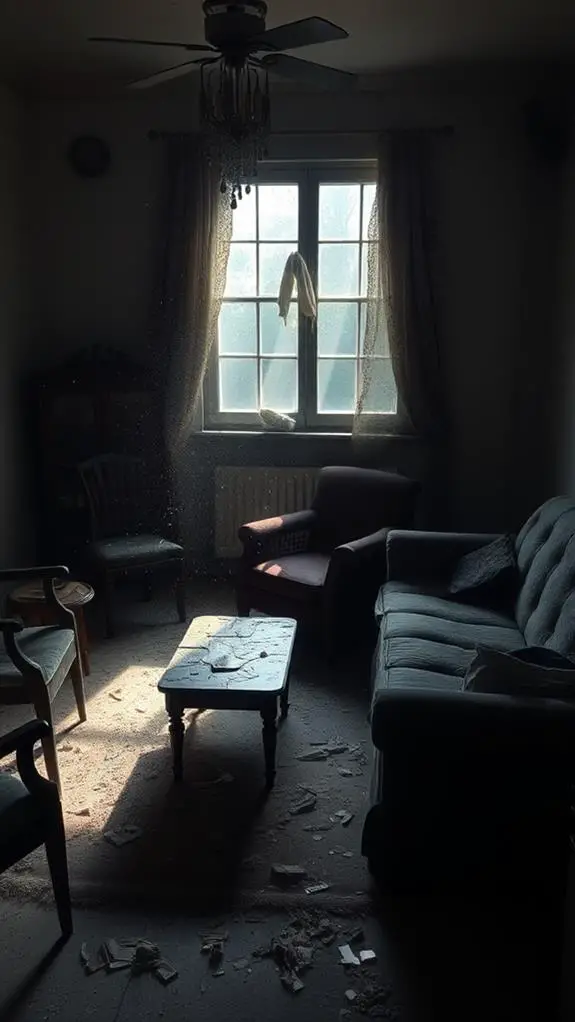
When you look around your home, you might notice a few pieces of broken or unused furniture taking up valuable space.
These items can clutter your environment and hinder your journey toward minimalistic living. Instead of holding onto them, consider whether they're worth the effort of furniture repairs or if it's time to let them go.
If a piece has sentimental value, think about how you can repurpose it creatively to fit your current style. Otherwise, donating or selling unused furniture can free up space and offer someone else the chance to enjoy it.
Embracing a clutter-free space not only enhances your home but also encourages a more innovative and functional lifestyle.
Let go and breathe easier!
Excessive Home Decor

Amidst the beauty of your home, excessive decor can create a chaotic atmosphere that distracts from the spaces you truly love.
Embracing minimalist design allows you to highlight key pieces that resonate with you, rather than overwhelming your senses. Look at current decor trends; they often celebrate simplicity and functionality.
Start by evaluating each item—does it bring you joy or serve a purpose? If not, it's time to let it go.
Streamlining your decor won't only enhance your home's aesthetic but also create a more peaceful environment. Focus on fewer, high-quality pieces that reflect your style.
Unread Books

Many homeowners find themselves surrounded by stacks of unread books, each one a promise of a new adventure or knowledge that remains unfulfilled.
If your reading goals feel like distant dreams, it might be time to reassess your collection. Start by organizing your books; keep only those you genuinely intend to read. You can create a "to-read" shelf that excites you, while letting go of the rest.
Consider donating or selling the books you've lost interest in. This not only declutters your space but also opens up room for new titles that align with your interests.
Old Towels and Linens
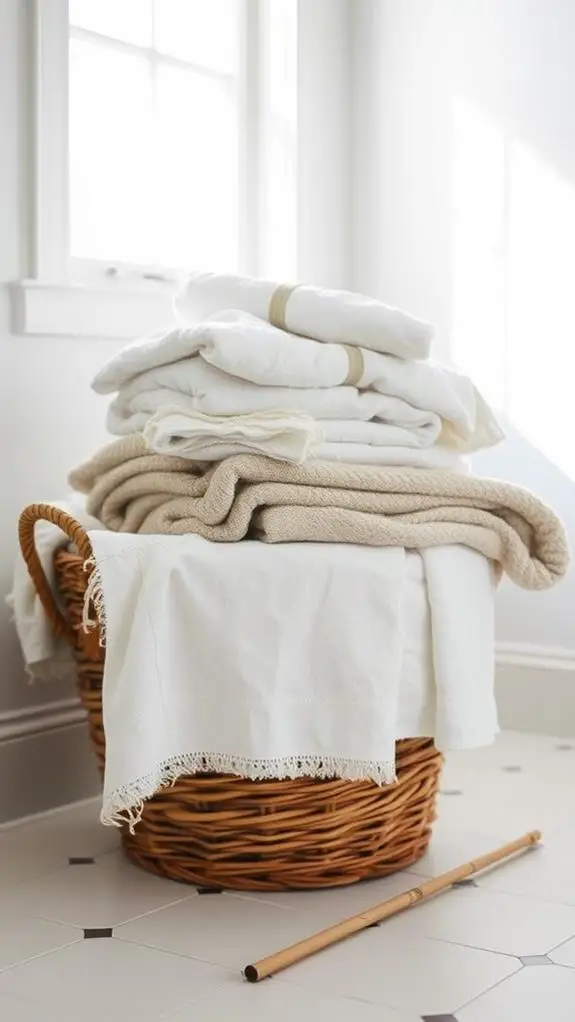
Old towels and linens can quickly become a source of clutter in your home, often taking up valuable space without serving a purpose.
Take a moment to assess what you really need. If you've got towels that are worn out or linens you haven't used in ages, it's time for a change.
Consider creative towel storage solutions, like baskets or shelves, to keep what you truly use accessible.
For items you don't need, think about linen donation—it's a great way to give back to your community while clearing out your space.
You'll feel lighter and more organized, making room for items that enhance your life.
Embrace innovation in your home by letting go of the old and welcoming the new.
Unnecessary Kitchenware
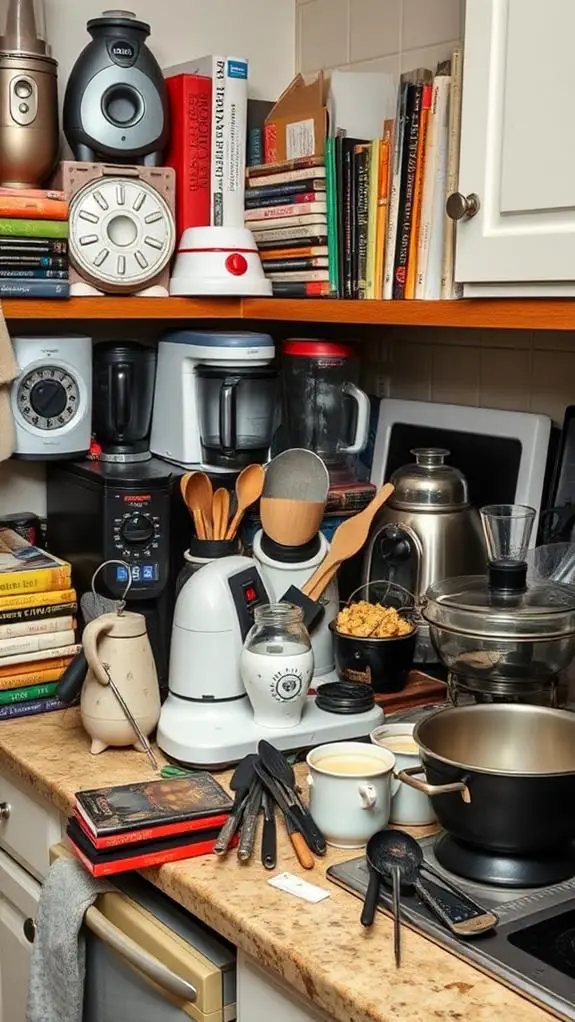
After tidying up your towels and linens, it's time to take a hard look at your kitchenware.
Start by identifying unnecessary dishware—those sets you rarely use or duplicates cluttering your cabinets. If you've got excessive utensils that haven't seen the light of day in months, consider letting them go.
Ask yourself if each item serves a purpose or if it's just taking up space. Remember, a minimalist kitchen enhances creativity and cooking efficiency.
You don't need every gadget out there; often, a few quality tools will do the trick.
Decluttering your kitchenware not only frees up space but also revitalizes your cooking experience. Embrace simplicity, and enjoy a streamlined kitchen that inspires culinary innovation.
Random Knickknacks
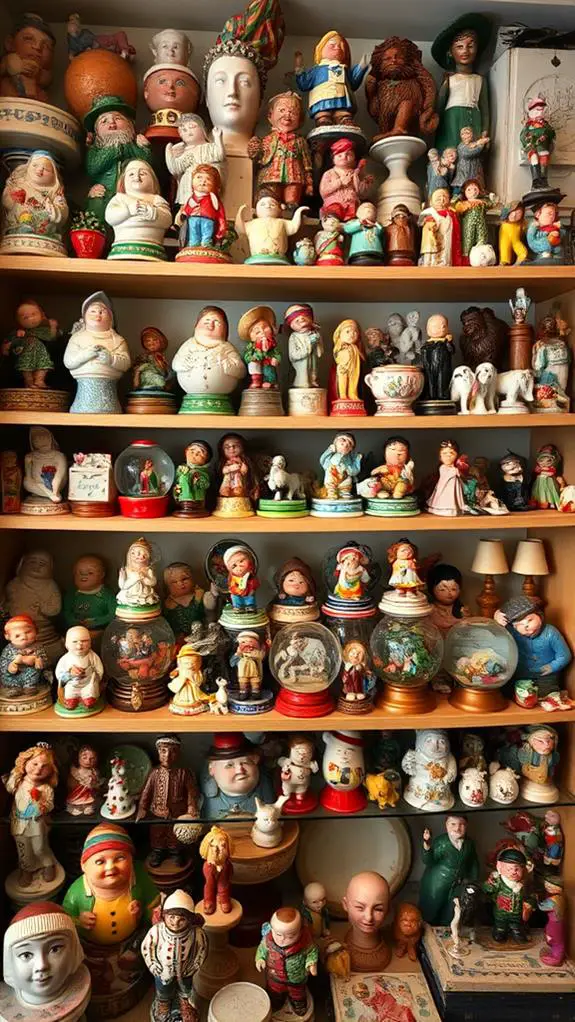
Tackle those random knickknacks cluttering your space by evaluating their value and significance. Look closely at those quirky souvenirs you've collected over the years. Do they still spark joy, or are they just gathering dust? If they remind you of a special trip or a moment in time, consider keeping one or two that truly resonate.
Next, assess the sentimental gifts you've received. While they may hold memories, holding onto every piece can overwhelm your space. Choose a few that genuinely represent meaningful relationships and let go of the rest.
FAQs
How Can I Decide What to Keep or Toss?
Deciding what to keep or toss can feel overwhelming, but start by evaluating emotional attachment and practical usage.
If an item sparks joy or holds significant memories, consider keeping it, but only if you truly value it.
For items that lack practical usage or emotional significance, it's often best to let go.
Ask yourself if it enhances your life—if not, it might be time to say goodbye and make space for what truly matters.
What Are Eco-Friendly Ways to Dispose of Items?
When you're looking to dispose of items, consider eco-friendly options that promote waste reduction.
Start by researching local recycling programs, as they often accept various materials. You can also donate usable items to charities or community groups.
For items that can't be recycled, look for upcycling opportunities to give them a new life.
Engaging in these practices not only helps the environment but also fosters a sense of community and innovation.
Should I Donate or Sell My Decluttered Items?
When deciding whether to donate or sell your decluttered items, consider your goals.
If you want to support your community, donation strategies can help local charities. If you're looking for extra cash, explore sell options like online marketplaces or garage sales.
Both paths have their merits; donating gives you a sense of fulfillment, while selling can boost your budget.
Weigh your priorities, and choose the option that aligns with your values and needs.
How Often Should I Declutter My Home?
You should aim to declutter your home regularly to maintain a fresh, organized space.
A good decluttering schedule could be monthly or seasonally, depending on your lifestyle.
Start small; tackle one room at a time.
Use decluttering tips like the "one in, one out" rule to manage new items.
Stay committed to keeping your space clutter-free, and you'll find it easier to enjoy your home and feel more in control.
What Are the Benefits of Decluttering Regularly?
Regularly decluttering your space brings significant benefits.
You'll experience mental clarity as you create an organized environment, allowing your mind to breathe and think more freely. With less clutter around, you'll notice improved focus on tasks that matter.
This practice not only enhances your productivity but also fosters a sense of calm. By making decluttering a habit, you innovate your living space and uplift your overall well-being, transforming your daily experience.
Conclusion
Decluttering your home doesn't have to be overwhelming. By letting go of outdated electronics, expired medications, and unused kitchen gadgets, you're making space for what truly matters. Remember, it's okay to part with duplicate items, old magazines, and unread books. You deserve a tidy, functional living space that reflects your life today. Take a step-by-step approach, and soon you'll feel lighter and more organized. Embrace simplicity and enjoy the clarity it brings to your home.

